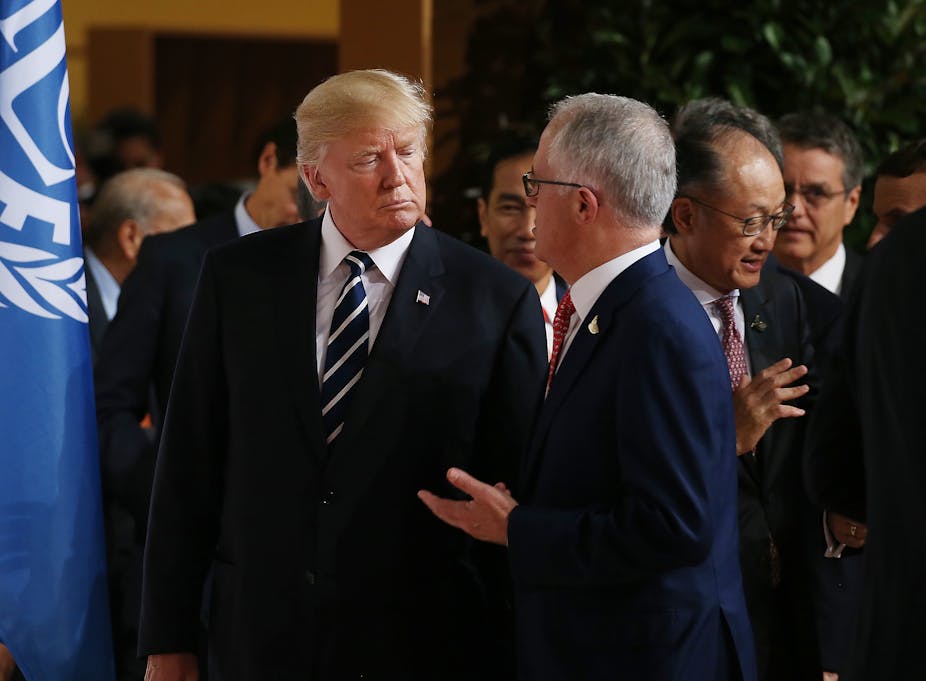We’ve known for months the content and tenor of that explosive January phone call between Donald Trump and Malcolm Turnbull about the refugee deal, but the leak of the transcript to The Washington Post provides crucial detail and nuance.
It also opens the exchange to two interpretations, which quickly fed into the domestic political battle.
You can read the conversation as showing Turnbull playing the strong leader, bringing measured argument and, despite constant provocation, an even temper to try to have Trump honour the deal Australia made with the Obama administration to take refugees from Manus Island and Nauru.
Or you can observe Turnbull as the rather desperate supplicant, with the domestic political importance of the deal being his overwhelming concern.
It’s obvious Trump was only minimally across the agreement’s terms, under which the US had agreed to take up to 1,250 refugees.
He exaggerated the numbers, referring to 2,000, even saying he’d heard 5,000. They had to be “bad” people – they were “in prison”.
He found it difficult to get his head around the boat issue. “What is the thing with boats? Why do you discriminate against boats?” Maybe that questioning wasn’t as strange as it sounds, in light of Turnbull declaration that: “We would rather take a not very attractive guy that help[s] you out than to take a Nobel Peace Prize winner that comes by boat”.
Above all, Trump was preoccupied with how accepting the agreement would make him look.
Turnbull suggested a way to square away the contradictions in his situation. But the president wasn’t countenancing such spin, refusing to concede he could present the deal as consistent with his just-announced exclusionist policy.
“This shows me to be a dope,” he said, in a not-unrealistic assessment.
“This is going to kill me. I am the world’s greatest person that does not want to let people into the country. And now I am agreeing to take 2,000 people.”
In their excruciating exchanges, Turnbull extracted Trump’s reluctant agreement to honour the arrangement. But agreement to what exactly?
As Turnbull put his case, he seemed to shrink the deal to be little more than the Americans having to simply put the refugees through a process.
Asking Trump to “hear me out”, Turnbull said: “The obligation is for the United States to look and examine and take up to and only if they so choose – 1,250 to 2,000”. (Elsewhere he clarified it was 1,250.)
“Every individual is subject to your vetting. You can decide to take them or to not take them after vetting. You can decide to take 1,000 or 100. It is entirely up to you. The obligation is to only go through the process.”
In fact, the deal “does not require you to take any”.
Turnbull’s minimising the US’s obligation is particularly important in light of the fact that so far not one of the refugees has been moved, and now the American general refugee quota is full – delaying any departures until October at the earliest. After the agreement was confirmed by the new administration, the timetable has been tortoise-like.
Turnbull’s desperation is obvious in the conversation. “This is a very big issue for us, particularly domestically,” he said at one point, and at another: “I am asking you as a very good friend.
"This is a big deal. It is really, really important to us that we maintain it. It does not oblige you to take one person that you do not want.”
Turnbull sought connection with the then-new US leader by referencing their common business backgrounds, and saying “there is nothing more important in business or politics than a deal is a deal”. To which Trump countered, “I respect you, but I guarantee that you broke many a stupid deal”.
Turnbull described himself as a “highly transactional businessman like you”.
His case to Trump was pitched in blatantly transactional terms. He referenced the Central Americans Australia had agreed to take, making it clear it was a quid pro quo for the Manus/Nauru arrangement – something he’d previously denied. If necessary Australia would take more people – “anyone that you want us to take”.
He stressed the deal required Australia “to do a number of things for the United States”.
At the end, after an angry Trump refused to talk about Syria and North Korea and was just determined to get off the phone – “I have had it” - came this exchange:
Turnbull: Thank you for your commitment. It is very important to us.
Trump: It is important to you and it is embarrassing to me. It is an embarrassment to me, but at least I got you off the hook. So you put me back on the hook.
Turnbull: You can count on me. I will be there again and again.
Trump: I hope so.
Turnbull was undesirably fulsome in declaring he’d be “there again and again”, especially given the nature of this president.
This is even clearer in retrospect – Trump’s capriciousness and his administration’s dysfunction has only increased in the months since the phone call.
One expects Trump will not forget he is owed for the favour he sees himself having done in endorsing the deal.
“I will be there again and again” may go down as the Turnbull equivalent of “all the way with LBJ” (Harold Holt) and “we’ll go a Waltzing Matilda with you” (John Gorton).
The government’s challenge is to position itself with this difficult administration in a way that keeps the alliance strong but does not compromise Australia or its values. To be in Trump’s debt is unfortunate; for Turnbull to make what sounds like a gushy if vague pledge is unwise.
One final thing. When Trump described the earlier reports of the call as “fake news” and Turnbull, sitting beside him in New York, agreed, they were both lying. We knew it at the time, but the transcript has provided an effective lie detector.

